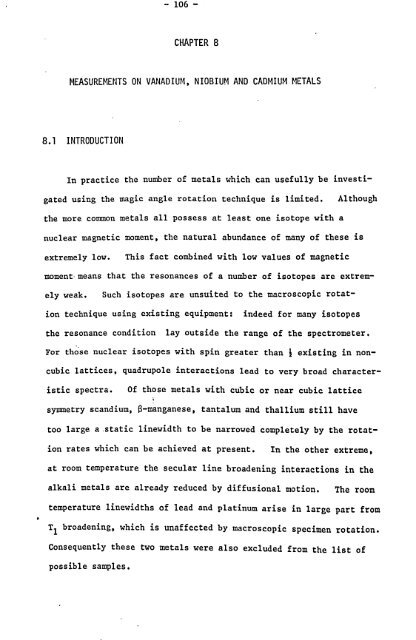NNR IN RAPIDLY ROTATED METALS By - Nottingham eTheses ...
NNR IN RAPIDLY ROTATED METALS By - Nottingham eTheses ...
NNR IN RAPIDLY ROTATED METALS By - Nottingham eTheses ...
Create successful ePaper yourself
Turn your PDF publications into a flip-book with our unique Google optimized e-Paper software.
0<br />
- 106 -<br />
CHAPTER 8<br />
MEASUREMENTS ON VANADIUM, NIOBIUM AND CADMIUM <strong>METALS</strong><br />
8.1 <strong>IN</strong>TRODUCTION<br />
In practice the number of metals which can usefully be investi-<br />
gated using the magic angle rotation technique is limited. Although<br />
the more common metals all possess at least one isotope with a<br />
nuclear magnetic moment, the natural abundance of many of these is<br />
extremely low. This fact combined with low values of magnetic<br />
moment- means that the resonances of a number of isotopes are extrem-<br />
ely weak. Such isotopes are unsuited to the macroscopic rotat-<br />
ion technique using existing equipment: indeed for many isotopes<br />
the resonance condition lay outside the range of the spectrometer.<br />
For those nuclear isotopes with spin greater than } existing in non-<br />
cubic lattices, quadrupole interactions lead to very broad character-<br />
istic spectra. Of those metals with cubic or near cubic lattice<br />
symmetry scandium, ß-manganese, tantalum and thallium still have<br />
too large a -static<br />
linewidth to be narrowed completely by the rotat-<br />
ion rates which can be achieved at present. In the other extreme,<br />
at room temperature the secular line broadening interactions in the<br />
alkali metals are already reduced by diffusional motion. The room<br />
temperature linewidths of lead and platinum arise in large part from<br />
T1 broadening, which is unaffected by macroscopic specimen rotation.<br />
Consequently these two metals were also excluded from the list of<br />
possible samples.

















